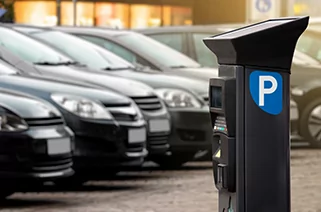⬤ ⬤ ⬤
Commuter Benefits: Everything you need to know about them
If you are an employer looking for ways to improve employee satisfaction, reduce costs, and do your part to help save the planet, commuter benefits can be an excellent choice. These programs offer a range of incentives that help employees save money, improve their commuting experience, and reduce their carbon footprint. And if you want to know everything about commuter benefits, read more in the article we have prepared for you.

What are commuter benefits?
Commuter benefits, also known as transportation benefits for employees, are programs offered by employers to help employees save money and improve their commuting experience. These benefits can include incentives for using public transportation, such as bus, train, metro as well as tax-free parking benefits.
Commuter benefits are designed to help employees reduce the financial burden of commuting, increase accessibility, and reduce the carbon footprint, ultimately improving employee satisfaction and retention. They can be particularly important for companies struggling to attract and retain talent in a competitive job market.
By offering commuter benefits, companies can save money through tax incentives, improve employee satisfaction and productivity, reduce traffic congestion, and improve air quality in their communities. In addition, commuter benefits can help companies achieve their environmental sustainability goals while creating a healthier and happier workplace for their employees.
Commuter benefits are available in many metropolitan areas and may include various types of benefits depending on the company and location. It is important to check local laws and regulations to understand which benefits are available and which can be offered to employees. In general, commuter benefits are offered by companies committed to improving the quality of life for their employees and creating a healthy and sustainable work environment.
⬤ ⬤ ⬤

How do commuter benefits work?
There are several options of transportation benefits for employees, each with their own rules and regulations. For example, transit benefits usually offer tax discounts for employees who use public transportation, while parking benefits offer free or discounted parking for employees who drive to work. Some companies also offer incentives for employees who walk or bike to work, such as equipment discounts or rewards for miles traveled.
Employee transportation benefits are an excellent choice for companies looking to improve employee satisfaction, reduce costs, and reduce their carbon footprint. These programs can be customized to meet the needs of each company and its employees, offering convenient and sustainable transportation options that benefit everyone.

Which types of commuting are included?
Commuter benefits programs offer a range of transportation options to help employees save money, improve their commuting experience, and reduce their carbon footprint. Let’s take a closer look at some of the most common types of commuting included in these programs:

Tax-free transit
Many commuter benefits programs offer tax-free transit benefits, which allow employees to pay for their transit expenses with pre-tax dollars. This can include expenses such as subway, bus, or train fares, as well as vanpooling or ferry costs. By using pre-tax dollars to pay for transit expenses, employees can save money on their commute and reduce their taxable income.

Tax-free parking
In addition to tax-free transit benefits, some commuter benefits programs also offer tax-free parking benefits. This one allows employees to pay for their parking expenses with pre-tax dollars, which can include expenses such as parking garages or lots near their workplace. By using pre-tax dollars to pay for parking expenses, employees can save money and reduce their taxable income.

Micromobility
Micromobility options such as bike-sharing or scooter-sharing programs may also be included in some commuter benefits programs. These programs allow employees to rent bicycles or electric scooters for short trips to and from work or for errands throughout the day. By offering these services, employers can help reduce traffic congestion, promote healthy habits, and reduce carbon emissions.

Public transportation
Public transportation options such as buses, trains, and subways may also be included in commuter benefits programs. In addition to tax-free transit benefits, some programs may offer discounts or subsidies for public transportation passes or tickets. This can make it more affordable for employees to use public transportation and reduce their carbon footprint.

Others
Commuter benefits programs can be customized to meet the needs of each individual employer and their employees. Other types of commuting options that may be included in these programs could be shuttle services. By offering a variety of transportation choices, employers can help employees save money, reduce their carbon footprint, and improve their commuting experience.

Who is eligible for commuter benefits?
Commuter benefits are typically offered by employers to their employees as a perk or incentive. However, the eligibility requirements for these benefits can vary depending on the specific program and the employer’s policies.
In general, commuter benefits are available to full-time and part-time employees who commute to work via public transportation. Some programs may also include parking benefits for employees who drive to work.
It’s important to note that self-employed individuals and independent contractors are not eligible for commuter benefits, as these benefits are tied to an employer-employee relationship.
Do commuter benefits expire?
The answer to this question depends on the specific commuter benefits program. Some programs have expiration dates for the funds that are allocated to employees, while others may allow the funds to roll over from year to year.
For example, the tax-free transit benefit under the IRS Section 132 program has a monthly cap and any unused funds do not roll over to the following month. However, the tax-free parking benefit has an annual limit and any unused funds can be carried over to the next year.
It’s important for employees to check the details of their specific commuter benefits program to understand if and when their benefits may expire.


Top 5 pains of commuting and how commuter benefits can alleviate them
High commuting costs
Commuting can result in high expenses, especially for those who live far away from their workplace. A commuter benefits program can provide tax-free benefits for transportation and parking, which can help employees save on their commuting costs. With these alternatives, employees can save money on transportation expenses and use those resources for other financial needs or to improve their quality of life.
Stress and frustration
Commuting can be a stressful and frustrating experience, especially in urban areas with heavy traffic. A commuter benefits program can offer transportation options such as vanpooling and public transit, which can help employees avoid the stress of driving in traffic. With these alternatives, employees can reduce the stress and frustration associated with daily commuting and improve their quality of life.
Lack of accessibility
Commuting can be challenging for employees who live in areas with limited transportation options. A commuter benefits program can provide a variety of transportation options that make it easier for employees to get to work, such as bike-sharing programs or shuttle services. These options can be especially helpful for employees who live in areas that are not well-served by public transportation or who may not have access to a personal vehicle. By providing alternative transportation options, employers can help ensure that all employees have the ability to get to work reliably and efficiently, regardless of their location.
Environmental impact
Commuting is a major contributor to carbon emissions, which can have a negative impact on the environment. A commuter benefits program can offer sustainable transportation choices that encourage employees to reduce their carbon footprint, such as public transit or bike-sharing programs. By promoting environmentally friendly commuting options, companies can contribute to a more sustainable future and show their commitment to reducing their environmental impact. Additionally, some commuter benefits programs may offer incentives for employees who choose greener transportation alternatives, such as rewards for biking or walking to work.
Time-consuming
Commuting can be a time-consuming experience, particularly for employees who have long commutes. A commuter benefits program can provide transportation options that help employees save time, such as express bus or train service, which can help reduce commuting time and improve work-life balance. With these options, employees can feel less overwhelmed and have a better quality of life.

Why are they important for the employer?
Employee benefits programs are essential for the success of a company and its ability to attract and retain high-quality talent. These programs offer employers a variety of advantages, ranging from increased productivity to compliance with local regulations. Below, we will discuss some of the main benefits that these programs can offer to employers.
Attracting and retaining top talent
An employee benefits program can be a differentiator when it comes to attracting and retaining talent in a company. Nowadays, many professionals seek employers who offer benefits beyond salary, such as transit benefits, health plans, paid vacations, and wellness programs. An employee benefits program can be seen as an important benefit for many candidates and can influence the decision to accept a job offer. In addition, offering a benefits program can help increase the satisfaction of employees who already work in the company, reducing turnover.
Cost savings
A commuter benefits program can bring significant savings for both the company and the employees. With more economical transportation options, such as carpooling or the use of public transportation, employees can save money on gas and vehicle maintenance.
Increased productivity
Offering transportation options that reduce commuting time can help employees arrive at work more rested and less stressed, which can increase productivity. Employees who have a better work-life balance also tend to be more productive and committed to their work.
Corporate social responsibility
Offering sustainable transportation options can be a way to show corporate social responsibility. With options such as shared bicycles and public transportation, the company can help reduce carbon emissions and decrease environmental impact. This action can improve the company’s image in the community and increase employee loyalty, who can be proud to work for a company that cares about environmental issues.
Compliance with local regulations
Some cities and regions have regulations that require companies to offer sustainable transportation options or reduce the amount of traffic in congested areas. Offering an employee benefits program for commuting can help companies comply with these regulations and avoid fines or penalties. Additionally, complying with these regulations can help the employer improve the company’s relationship with local authorities and the community in general.
Improved business culture
An employee benefits program can have a significant impact on a company’s culture. By providing benefits that promote employee well-being and work-life balance, the company can demonstrate that it cares about the well-being of its employees and values their contributions to the company.
In addition, a well-planned benefits program can help strengthen the company culture and make it more attractive to potential employees. A positive culture can increase employee satisfaction and reduce turnover, which can save costs for the company in the long run.
By creating a supportive culture and encouraging employees to take care of their health and well-being, the company can create a positive and healthy work environment that benefits both employees and the company as a whole.

Edenred commuter benefits program overview
Edenred Benefits is a leading provider of pre-tax commuter benefits in the country. Our team is dedicated to providing outstanding customer service while offering the best programs for companies of all sizes. Our programs combine quality, competitive pricing and full compliance with IRS regulations.
⬤ ⬤ ⬤
Everybody wins with commuter benefits
Good for your company
 |
Save an average of 7.65% on payroll taxes annually |
 |
Employee online ordering |
 |
Employer payroll reporting |
 |
Attract, retain and engage employees |
Good for your employees
 |
Save on average of $700 a year on income taxes |
 |
Easy online ordering |
 |
Many commuting options |
 |
Creates healthy habits |
Good for the environment
 |
Employees that switch from driving to taking public transportation can reduce their carbon dioxide emissions by up to 20 pounds a day and 4,800 a year. |
Building your commuter benefit program
Setting up my company’s program
Depending on which program you select, your account will be ready for order processing in as little as 1-2 business days.
Choosing a program
Edenred Benefits offers two different programs guaranteed to fit your company’s needs and budget. All of our programs provide nationwide coverage.
Subsidies vs. pre-tax deductions
A subsidy is an employer paid benefit, whereas, a pre-tax deduction is an employee paid payroll deduction. Commuter benefits can be offered as either a subsidy, pretax payroll deduction or a combination of both.
⬤ ⬤ ⬤
Current commuting solutions

Public Transit
Public Transit includes bus, train, subway and ferry services. We offer many options to pay for public transit such as our prepaid card, smart cards and transit passes.

Vanpool
Vanpools are similar to carpools. They carry between 5-15 people who commute to and from work together in a van or SUV.

Biking
Pay for bicycles, bicycle equipment, repairs, and/or storage fees associated with your commute to work at participating bicycle shops nationwide.

E-scooter Sharing
Environmentally friendly and affordable, e-scooter is a great way to get to work for the urban commuter. You can pay for e-scooter sharing with your prepaid card.

E-moped Rental
Get to and from work while having a little fun with electric moped ridesharing. A simple and affordable commuting alternative without the hassle of gas or keys.

Corporate Shuttle Service
A smart shuttle solution that combines technology, efficiency, savings and sustainability in a single service.
⬤ ⬤ ⬤
Payment Methods
 |
Prepaid Cards Our prepaid commuter benefits card can be used to pay for public transit, parking, bike share, and e-scooter sharing. It’s fully integrated into your commuter benefits account. |
 |
Smart Cards We offer several transit agency-specific Smart Cards across the nation. We are constantly adding more to our catalog. |
 |
Transit Passes We offer products for hundreds of transit agencies nationwide. Select your transit pass through your online account, and you will receive your product by mail each month. |
 |
Vouchers Vouchers are redeemable for transit, parking, vanpool purchases, or towards biking expenses associated with your commute to work. |
 |
Mobile Payments Edenred’s mobility account is compatible with OMNY in NYC, supports Apple/Google Digital Wallets, New Jersey Transit App. |
Guaranteed Ride Home
|
Edenred Guaranteed Rides give employees a sure-fire way to get where they need to go, by providing them with alternative modes of transportation. Whether they want to avoid crowds, get home in an emergency, or go to an event, they can get there without the stress. Here’s how it works:
✔ Employees can set up a rideshare, taxi ride, rental car, or use public transportation for their Guaranteed Ride. ✔ Employees can request the ride, the ride will take them to their desired location, and get reimbursed after they file a claim with their employer. ✔ Reimbursement for public transportation, taxi, rental car, or rideshare is available for up to $25 per claim or $50 per month. ✔ Employees can file up to two claims per month. The claims must be submitted within 30 days of the trip date, and employees will receive a reimbursement check in the mail. ✔ Employees also can order a private Lyft ride directly from the Edenred Benefits mobile app. |
Commuter Benefits:
your employees’ modern solution
Make commuter benefits part of your organization’s value proposition for your employees and for your organization. Talented candidates will be drawn to your organization if you make it irresistible.
Ready to see what we can do? Schedule a free demo.
Fill out the form to schedule a demo.
Do not worry, your data is safe with us.




